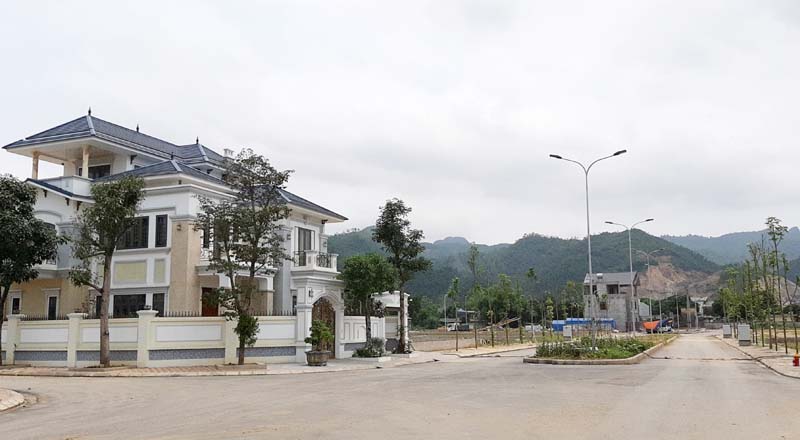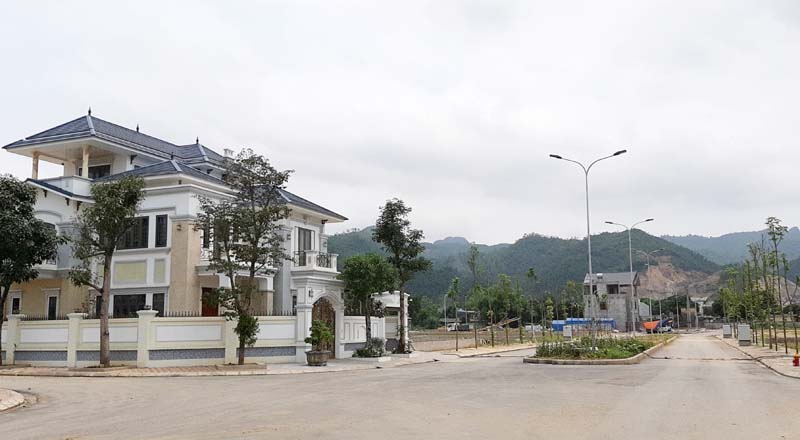
(HBO) - In the first quarter of 2019, Hoa Binh’s State budget collection completed 22 percent of the year’s target, up 4 percent year-on-year.
 The residential area project No.7 in Thinh Lang
ward of Hoa Binh city has helped create revenue from land use auctions for the
State budget.
The residential area project No.7 in Thinh Lang
ward of Hoa Binh city has helped create revenue from land use auctions for the
State budget.
Especially, the work made by the provincial Department
of Customs saw good results. The agency collected 69 billion VND in the first
three months of the year, equal to 53 percent of the plan set for the whole
year by the provincial People’s Council.
The department was requested to promote administrative reform and facilitate
enterprises’ operation to increase budget collection.
The province’s State budget collection is hoped to reach 4 trillion VND, up
about 200 billion VND compared to the target set in the resolution of the
provincial People’s Council.
The provincial Department of Finance has raise the
idea of accelerating the budget collection through implementing the two groups
of key solutions, striving to complete the budget revenue estimation in 2019
and the target of 5 trillion VND set in the resolution of the 16thprovincial Party Congress.
Attention will be paid to supporting enterprises in developing their production
and business.
Revenue will also be made from collecting land use fees and auctions. Compared
to other provinces, Hoa Binh’s revenue from land is very modest, reaching about
700 billion VND, only half of the land use fee of Son La province. If the
locality collects about 800 billion VND from land-related services and the
total revenue from districts and Hoa Binh city increases about 7 percent, it is
likely to realise the budget collection target of 5 trillion VND by 2020.
The provincial
People’s Committee has devised many measures to improve business environment and
overcome difficulties facing local enterprises’ production and business, as
well as support investors to soon put their projects into operation, towards
creating sustainable and stable revenue resources for the State budget. /.
According to data from the Hoa Binh Provincial Party Committee, the industrial production index for the first six months of 2025 is estimated to have increased by 20% compared to the same period last year. This marks the highest year-on-year growth rate for this period since 2020.
In the first six months of 2025, Hoa Binh province’s export turnover was estimated at 1.145 billion USD, marking an 18.11% increase compared to the same period in 2024. Import turnover was estimated at $ 804 million, a 17.15% increase, which helped the province maintain a positive trade balance.
The lives of the ethnic minority farmers in Tan Lac district have gradually improved thanks to the new directions in agricultural production. This is a testament to the collective strength fostered through the professional associations and groups implemented by various levels of the district’s Farmers’ Union.
With the motto the "product quality comes first,” after nearly one year of establishment and operation, Muong village’s Clean Food Agricultural and Commercial Cooperative, located in Cau Hamlet, Hung Son Commune (Kim Boi district), has launched reputable, high-quality agricultural products to the market that are well-received by consumers. The products such as Muong village’s pork sausage, salt-cured chicken, and salt-cured pork hocks have gradually carved out a place in the market and they are on the path to obtaining the OCOP certification.
In the past, the phrase "bumper harvest, rock-bottom prices" was a familiar refrain for Vietnamese farmers engaged in fragmented, small-scale agriculture. But today, a new spirit is emerging across rural areas of Hoa Binh province - one of collaboration, organisation, and collective economic models that provide a stable foundation for production.
Maintaining growing area codes and packing facility codes in accordance with regulations is a mandatory requirement for agricultural products to be eligible for export. Recently, the Department of Agriculture and Environment of Hoa Binh province has intensified technical supervision of designated farming areas and packing facilities to safeguard the "green passport" that enables its products to access international markets.



 The residential area project No.7 in Thinh Lang
ward of Hoa Binh city has helped create revenue from land use auctions for the
State budget.
The residential area project No.7 in Thinh Lang
ward of Hoa Binh city has helped create revenue from land use auctions for the
State budget.